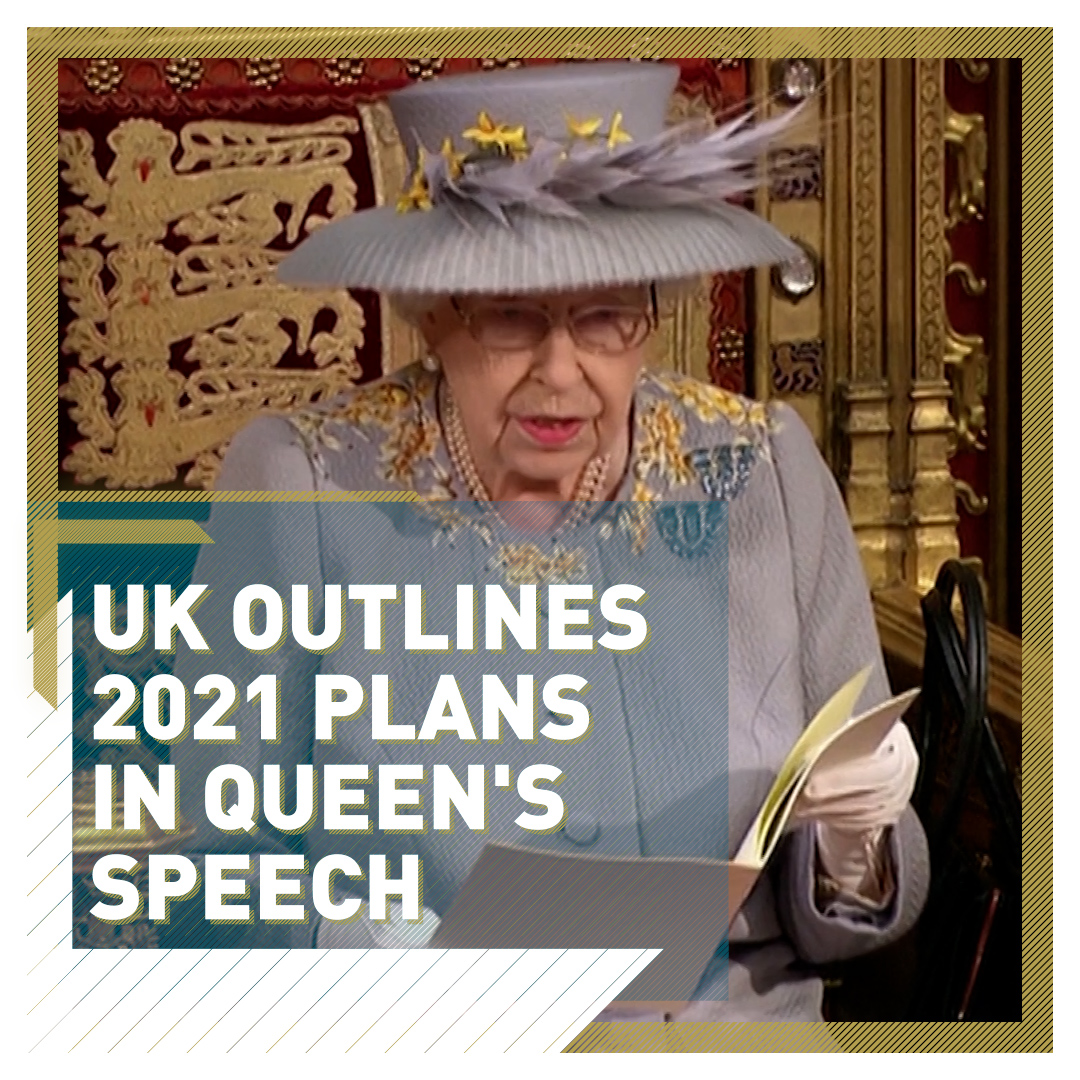
Queen Elizabeth II delivers her speech to the House of Lords amid COVID-19 restrictions. /Eddie Mulholland/Pool via AP
Queen Elizabeth II delivers her speech to the House of Lords amid COVID-19 restrictions. /Eddie Mulholland/Pool via AP
Britain's Queen Elizabeth II presented UK Prime Minister Boris Johnson's post-pandemic agenda in a speech, written by the government, that set out the new laws that ministers intend to pass in the coming year. It was her first major ceremonial duty since the death of her husband Prince Philip last month.
The speech set out Johnson's policy-making priorities as he plans the UK's recovery from the COVID-19 pandemic and seeks to fulfill the promises he made to voters in 2019 on creating new opportunities for poorer regions and toughening immigration policies.
What did she announce?
In a speech that lasted just over 10 minutes, the monarch outlined 30 new laws the government intends to pass into law in the coming year.
Alongside vows to increase funding to the country's National Health Service and continue the vaccination program, the government has pledged to "level up" the country with laws ostensibly aimed at "supporting jobs, businesses and economic growth, addressing the impact of the pandemic on public services," the Queen told the House of Lords.
"My government's priority is to deliver a national recovery from the pandemic that makes the United Kingdom stronger, healthier and more prosperous than before."
Johnson's government also promises to give election voting rights to some 3 million people, who have lived overseas for longer than 15 years – a manifesto pledge in 2019.
Key points:
- Employers based at eight UK freeports will be granted tax breaks.
- Restrictions on future prosecutions of UK soldiers following a recent case in Northern Ireland that was dismissed over inadmissible evidence.
- The asylum system will be reformed in a "fairer" process for applicants and to discourage migrants crossing the Channel.
- Police will be given new powers to limit or prevent protests, despite opposition from several of members of parliament (MPs), as part of the Police, Crime, Sentencing and Courts Bill.
- The removal of the reform introduced by David Cameron in 2016 of a fixed five-year period between general elections, allowing Boris Johnson to determine the date of the next national vote.
- Consultation will begin on making gay conversion therapy illegal.
01:06

READ MORE
What the elections mean for UK's future
French protests over climate change plan
10 stories you may have missed from China
There are new proposed laws on free speech in universities and making photo ID mandatory for all voters at elections. The latter has led to criticism from charities which argue that a quarter of voters do not have either a passport or driving licence, critics say.
What happens next?
Following the speech, Johnson will address the House of Commons, followed by the leader of the opposition Labour Party Keir Starmer. But before the debate can commence, two government backbenchers will open proceedings, as is traditional, by proposing and seconding the Queen's Speech.
The policies will be debated both today and in the coming weeks and months as particular pieces of legislation make their way through Westminster.

Boris Johnson leads MPs to hear the Queen's Speech as is tradition. /Stefan Rousseau/Pool via AP
Boris Johnson leads MPs to hear the Queen's Speech as is tradition. /Stefan Rousseau/Pool via AP
Why does the Queen make the speech?
In her role as Head of State, the ruling monarch has several duties to perform, which are largely ceremonial. The Gracious Address, more commonly known now as the Queen's Speech, takes place annually in the spring or after a general election.
It dates back to the time when the monarch was responsible for when parliament opened and still had the power to dissolve it. This was removed in 1641 when King Charles I finally agreed he could no longer dissolve parliament without its consent.
The speech occurs annually in May or after a general election.
The order of the current ceremony dates from 1852, when the Palace of Westminster – commonly referred to as The Houses of Parliament – was rebuilt following an 1834 fire.
The Queen's Speech also occurs in Australia and Canada, among other Commonwealth nations, all former British colonies where the British monarch remains the Head of State. Elizabeth II has, on occasion, delivered the speech to the respective Canadian and Australian parliaments, but usually the role is fulfilled by a royal representative – viceroys or governors.
Are there any changes amid COVID-19?
The grand State Opening of Parliament, as it's officially known, is usually a heavily choreographed and costumed ceremony. This year it incorporated the familiar particularities of the pandemic, with those involved having to pass a COVID-19 test, wear face masks and maintain social distancing.
The Queen did not arrive in a horse-drawn carriage and was not greeted by a military band as is tradition, but some of the more distinctive elements of the ceremony remain.
Ahead of the speech, MPs were summoned by a royal official, titled Black Rod, to the House of Lords. As part of the ritual, the door to the House of Commons, where MPs sit, was slammed in the face of Black Rod, symbolizing parliament's independence from the crown. Black Rod was eventually let into the house, and MPs led by Johnson followed Black Rod to the Lords to hear the Queen's Speech.
Video editor: Pedro Duarte
Cover picture: Queen Elizabeth II reads the from the throne in the House of Lords. /Chris Jackson/AFP
Source(s): Reuters

